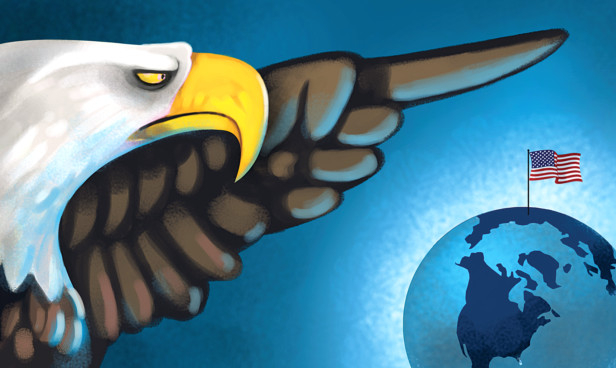By Mirza Kashif Baig
After world war II, UK’s colonial power started to shatter as per the international agreement but till the 1956 Suez Canal crisis, the UK enjoyed superpower status which was fizzled out by the USA asking the UK, France, and Israel to withdraw from the Suez Canal issue. The USA took the driving seat of the West, while the USSR remained to challenge which also ended in 1989 when the USSR collapsed after the Afghan war with the help of Pakistan and the USA became the world’s sole power. Since then and earlier, the United Kingdom of Britain remained a much close and loyal friend of the USA in Europe.
So much so that it accepted American demand to weaken the EU by leaving the European Union, which was gaining strength. Brexit has damaged UK interests also. Its fish market has been affected as EU countries are not buying. Other than this, for the first time after 1945, Britain has shown defiance in geopolitics when Foreign Secretary James Cleverly articulated Britain’s commitment to the global multilateral order.
In a speech addressed on 29 June 2023 at London Conference at Chatham House, Britain’s Foreign Secretary James Cleverly articulated the government’s commitment to a multilateral world order. In his words, the British government “cares deeply about multilateralism”, something “we’re deeply invested in”. Earlier this year, Foreign Office Minister Andrew Mitchell outlined Britain’s approach to international development. Alluding to the importance of multilateralism, Mitchell articulated Britain’s support for an “effective and ambitious rules-based international system” that tackles global challenges. The Foreign Secretary’s speech on multilateralism comes at a time in international history when geopolitical competition, tensions, and rivalries divide nation-states. Accordingly, cleverly referred to the present era as one “of growing geopolitical and geo-economic rivalry”. This message is backed up by the Integrated Review Refresh 2023 (IR2023), a paper outlining Britain’s foreign policy approach. Crucially, the paper updates the government’s policy priorities in response to the pace at which “inter-state, ‘systemic’ competition over the nature of the international order” has developed. This seems defiance of the US policy which is still sticking to the prime Superpower of the world or agrees with the USA to retreat from its stated position. Joe Biden the president of the USA, recently warned China when it infiltrated the space of America by sending a balloon that any effort to challenge American primacy over the world shall not be accepted. Though, American primacy is tricky one. US Security advisor claimed immediately after USSR’s collapse but it has always been a point of discussion in geopolitical circles and especially in Asia where China is emerging as a power to threaten American primacy. In its policies toward Asia, the United States has long sought to reconcile its unsurpassed military, economic, and rule-setting prowess with a desire for stability. Until recently, this was not hard to accomplish. Washington’s international dominance coincided with the post-1979 “Asian peace”a period of remarkable stability in East Asia and the Pacificand so the United States had little trouble holding sway over the region without provoking any conflicts. Over time, Washington even came to believe that U.S. supremacy and regional tranquility could not just coexist but were causally related. As a result, U.S. policymakers made many efforts to uphold its supremacy which is being threatened this time very seriously. About 60% of its forces are around the South China Sea and some more in the strait of Taiwan.
It has organized two NATO types of organizations AUKUS, Australia UK, and USA. The other one is Quad having India, Japan, Australia, and the USA itself in this Asian military NATO. Indian sea bases have been taken by the USA to use together with keeping communication between Indian sea forces and naval vessels and interface have been installed in Indian and American Aircraft carriers and other sea vessels to use against China. In addition, it would be used to engage China through India in Tibet. The USA has captured many islands in the South China region. More armies in Guam, the Philippines, and other South China Sea regions.
In any case, America is doing all a cowboy could do to frighten the opponent. China an emerging power is doing its best to counter cow-boyish policy. China has patience which America lacks. A war has to break out if this patience of China is broken. I do believe that America has more chances to win in this game as it has a specific plan which it discussed in 2010 and 2014. It can only be defeated or limited if the petrodollar system is checked, and hybrid war breaks out in the USA itself indigenously. Its contradictions take different directions to weaken its military complex which not be able to go to war to unite the United Nations of America. Now the question arises, the UK in this case is defying the USA or revisiting its policy taking into consideration, the international environment, or perhaps it is again working for America which is now considering accepting the fact that the world has now become a multipolar world? Is it stepping backward under the circumstances, but the facts do not coincide that America has given up its policy of supremacy over the world. Or it has started retreating under the cover of strength. More indications are required to reach the conclusion.
The author is the Editor of Monthly Interaction.


